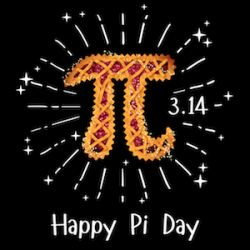We all remember Rebecca Black. Oh, do we remember. She sang "Friday," that awful but irresistibly catchy tune (viewed 105 million+ times on YouTube!!), which will forever be a part of our culture. Had she sung about Pi Day, however, perhaps the song would have had a more positive reception.
Today, March 14th (3/14), is Pi Day, because the mathematical number pi is rounded off to 3.14. Pi is an irrational number (meaning it cannot be adequately expressed as a fraction of two whole numbers) that is derived by dividing the circumference of a circle by its diameter.
Pi: Not Just Another Number
Pi is much more than a mathematical curiosity. The number comes up over and over again. Any calculation involving a circle or sphere will almost always involve pi. As we might expect, it has a place in Einstein's field equations for general relativity, since spacetime involves geometry. Curiously, pi can be derived in several different ways by adding up a series of infinite numbers. (Yes, that can actually be done.) The most famous, perhaps, is the Leibniz formula.
Imagine this: Take the number 1, subtract 1/3, add 1/5, subtract 1/7, add 1/9, subtract 1/11... and continue that pattern forever. Whatever sum you get, multiply it by 4. The answer is pi.
Pi is so enigmatic, that it sometimes surprises scientists by popping up in unexpected places. In late 2015, quantum physicists reported finding a version of the number when studying the energy states of electrons. According to Motherboard, one of the scientists involved in the research said, "What surprised me is that the formula occurred in such a natural way in the calculations, with no circles involved in determining the energy states."
No circles. Yet pi appeared.
Pi Isn't the Only Important Irrational Number
Pi gets all the attention, but there's another important irrational number worth mentioning: e, the base of the natural logarithm. Like pi, e shows up all over the place, most famously in exponential growth or decay equations. Unfortunately, the approximate value of e is 2.72, which explains why there is no E Day.


